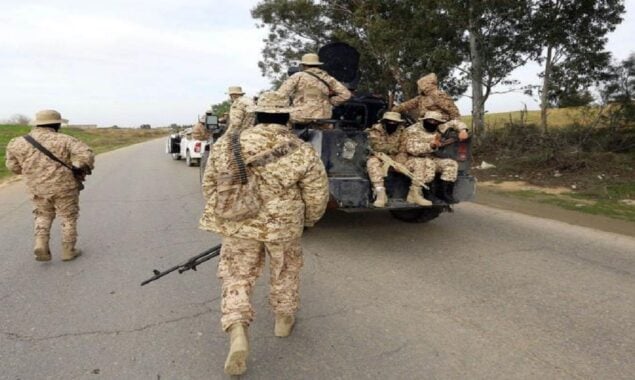Ukraine, Russia sign deal to reopen grain export ports as war rages on
Russia and Ukraine sign historic agreement to reopen Ukrainian Black Sea ports...

Fighting rips through Libyan capital, killing 13
TRIPOLI, July 22 (Reuters) – Rival factions clashed overnight and into Friday in Tripoli, killing 13 people in the Libyan capital’s worst clashes in two years during a dangerous political standoff.
Fighters exchanged fire in a central district that houses several government and international agencies, as well as diplomatic missions, and clashes spread to Ain Zara and Asbaa.
Both parties were members of the Presidency Council, a three-person body that served as the transitional head of state. According to an Interior Ministry spokesperson, they included the RADA force.
On Friday morning, fighters from RADA, one of Tripoli’s most powerful forces, were visible in most central areas, while the main Presidency Council building was empty.
Osama Ali, a spokesperson for Tripoli Ambulance and Emergency Services, confirmed 13 deaths and 27 injuries. According to an Interior Ministry spokesperson, three of the dead were civilians. A witness at a hospital reported seeing six bodies.
However, there were many fighters in the city centre, and a Reuters journalist heard more gunfire in Tripoli’s southern suburbs, where the telecom company reported that mobile connections were down due to the unrest.
Flights were rerouted to Misrata, about two hours drive from Tripoli, according to a security source and a passenger at the capital’s main Mitiga airport.
Libya has been on the verge of civil war for months after the eastern-based parliament rejected the Tripoli-based unity government, which was installed through a United Nations-backed process last year, and appointed a rival administration.
FACTIONS ARMED
Fathi Bashagha, the parliament-appointed prime minister, has been unable to enter Tripoli because groups in the capital supporting the Government of National Unity (GNU) and its prime minister, Abdulhamid al-Dbeibah, have barred his entry.
Political shifts in recent weeks have suggested a possible realignment among power brokers and armed factions, which could lead to renewed fighting.
The largest protests in years took place earlier this month in cities across Libya controlled by rival factions, highlighting popular outrage over the lack of elections and poor state services.
Following that, factions in several cities detained people suspected of involvement, prompting the United Nations mission in Libya to express concern on Thursday.
Meanwhile, a blockade of oil output by groups supporting eastern commander Khalifa Haftar had cut off funding to Dbeibah’s government.
However, Dbeibah appointed a new state oil company chief last week, who is said to be an ally of Haftar, resulting in a quick end to the blockade.
This fueled speculation about a deal between Haftar and Dbeibah to keep him in power. A senior officer from Haftar’s Libyan National Army (LNA) paid his first visit to Tripoli this week as part of scheduled talks to maintain a 2020 ceasefire.
Western Libyan armed factions fought Haftar during his assault on the capital in 2019-20 and refuse to accept his influence in Tripoli, which previously counted against Bashagha but may now be a problem for Dbeibah.
For the first time since his appointment by parliament, Bashagha travelled to Misrata, a key western city that is both his and Dbeibah’s hometown. The move sparked protests in the city from both groups supporting and opposing him.
Catch all the International News, World News, Breaking News Event and Latest News Updates on The BOL News
Download The BOL News App to get the Daily News Update & Follow us on Google News.